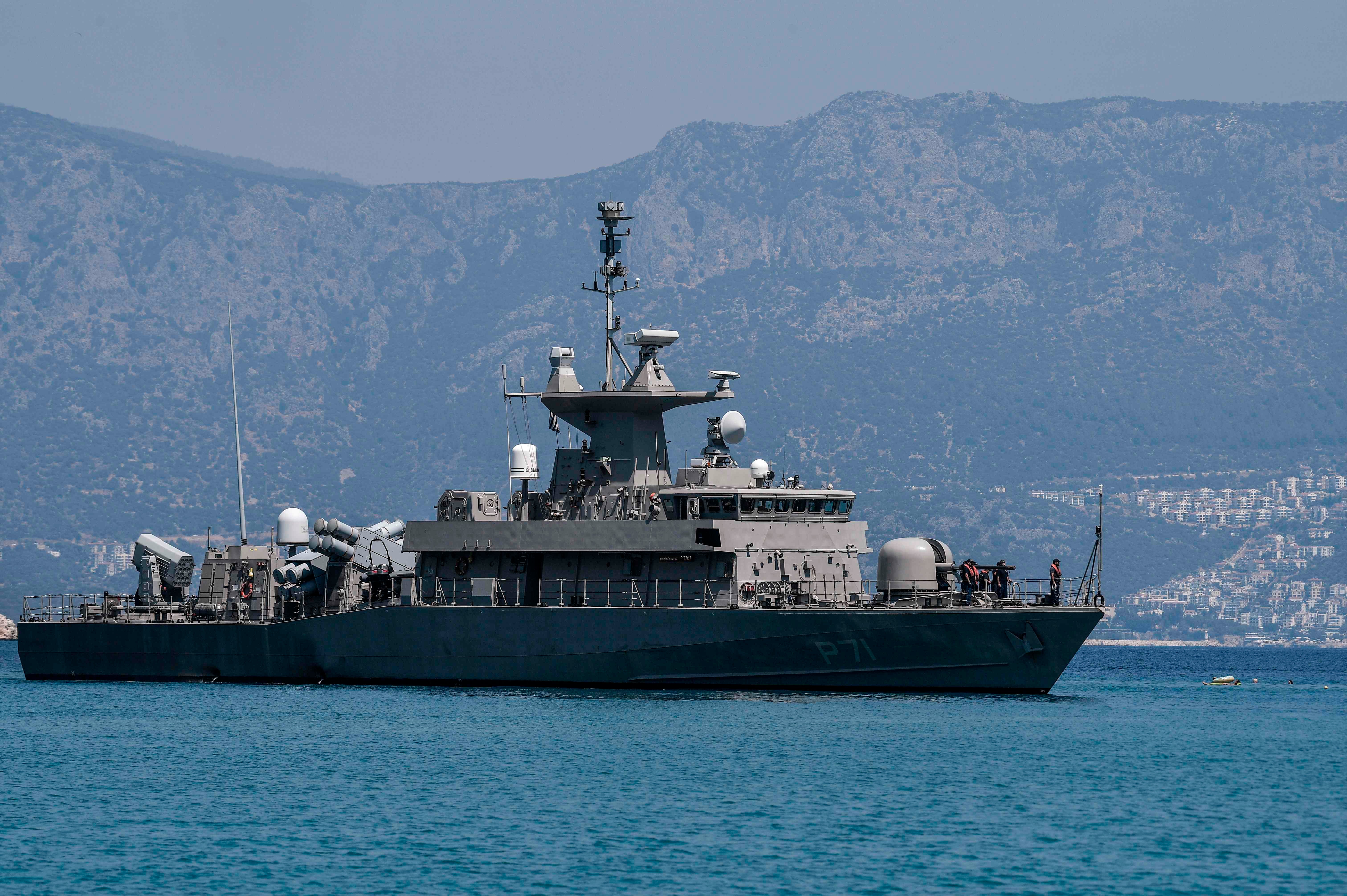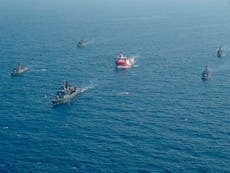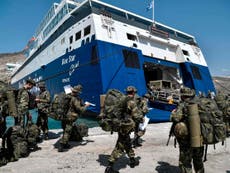Turkey and Greece tensions threaten to trigger conflict nobody wants
Borzou Daragahi explains how a long-standing problem between Turkey and Greece could get out of hand


On the still summer seas of the eastern Mediterranean off the tiny Greek island of Kastellorizo last month, the Turkish geological survey ship Oruc Reis set sail for a controversial trip to nearby waters.
Three Greek military vessels followed closely, and five Turkish warships also hovered nearby, guarding the Oruc Reis, which was scanning the ocean bed for possible gas and oil reserves even though Greece claims the area as part of its exclusive economic zone.
Tensions were high. The European Union, the US and UK had demanded Turkey hold off on the exploration mission, calling it a provocation. But Ankara went ahead anyway. It claims the water surrounding the island as part of its continental shelf. Indeed, Kastellorizo is less than two miles off the coast of Turkey, but 90 miles from the nearest Greek territory, on the ancient island of Rhodes.
A full account of what happened on 12 August has yet to emerge. Some officials and analysts suggest bored ship captains of the two Nato allies may have been playing chicken. Greece placed its forces on high alert a day earlier. But at one point, the 3,500-tonne Greek frigate Limnos smashed into the Turkish 3,100-tonne Kemal Reis.
Despite the considerable firepower aboard both ships, cool heads prevailed; no shots were fired. The damage was minimal, and both ships remained operational.
Greek officials described the incident as an accident. But Turks claim it came about because of provocative actions of the Greeks.
But for both sides, as well as for the nervous Nato officials in Brussels and other European nations, the incident underscored the dangers of the recent flaring up of the decades-long confrontation between Turkey and Greece along the eastern Mediterranean.
“It shows us how volatile of a situation it is and how close we are to a kinetic confrontation between the two forces,” says Asli Ayiıntasbas, a fellow at the European Council on Foreign Relations.
”Turkey and Greece have been in conflict about their shared waters on the Aegean and Mediterranean Seas since the founding of the Turkish Republic nearly 100 years ago. Those tensions have been exacerbated by the discovery of gas deposits in the eastern Mediterranean now being exploited by Israel, Egypt, Greece, Cyprus and other countries in a series of agreements that have excluded Turkey.
“You have a country like Turkey and they feel like a lot of stuff is happening around them and they’re being left out,” says Nikos Tsafos, an energy sector researcher at the Centre for Strategic and International Studies in Washington. “I understand that can be frustrating. That’s at the core of this.”
But domestic considerations are driving both sides in the conflict, especially in Turkey, where a severe economic downturn has compelled the government of president Recep Tayyip Erdogan to shore up his political base with nationalist entreaties. And few other causes serve to unify and motivate Turkey’s Islamist and nationalist right than enmity towards Greece.
“This is not about gas,” says one senior European diplomat. “It’s about Erdogan staying in power. He finds himself endangered by the economic situation. This is ultimately about new Turkey asserting itself because of the weakening of the leadership.”
In a poll released last month, Erdogan was behind Istanbul mayor Ekrem Imamoglu and Ankara mayor Mansur Yavas, both members of the liberal-nationalist opposition. Presidential elections in Turkey aren’t scheduled until 2023.
But other factors are driving the eastern Mediterranean tensions. The main backdrop is the historic and potentially game-changing end of the process that was drawing Turkey into the EU. The accession process gave Ankara an incentive to maintain good ties with Greece and encourage a healing of wounds with Cyprus.
The lingering frozen conflict between Cyprus and Turkish-run North Cyprus is another major source of tension, with Ankara insisting on maritime and other rights for its surrogate state that no other country acknowledges.
Turkey last year signed a hotly disputed maritime deal with Libya which gives it rights over much of the eastern Mediterranean despite the opposition of the other littoral states.
Diplomats also cite the declining authority of the US, which has created a power vacuum in the eastern Mediterranean that regional powers are scrambling to exploit.
Still, neither Turkey nor Greece want an armed conflict, and Nato officials are rushing to de-escalate.
It shows us how volatile of a situation it is and how close we are to a kinetic confirmation between the two forces
“Barring an accident happening, this situation will fizzle out,” says Yoruk Isik, a geopolitical risk analyst focused on Eurasia. “Neither side has the economic power to fight each other. They’re testing new limits in an unhealthy environment.”
The technical disagreement between Athens and Ankara is the internationally recognised Greek claim that its tiny islands such as Kastellorizo have the same jurisdiction as its mainland. Such a rule of maritime exclusivity zones may not be controversial in the South Pacific. But in the context of the cramped waters, that is a tricky standard that effectively encroaches on Turkish coastlines. Ankara insists it is unfair to give tiny islands the same territorial clout as its mainland, and many international law experts sympathise with the Turkish position.
Nevertheless, the dispute over territorial waters has been ongoing for decades, and the timing of the latest confrontations has prompted many to question Turkey’s motives in sending ships out on expensive exploration missions that have yielded nothing. Meanwhile, Turkey recently announced an undersea gas discovery in its own undisputed Black Sea waters that it has proudly trumpeted.
“I’m not sure if Turkey’s exploring anything,” says Tsafos, of CSIS. “They’re sending the ships to make a point. They’re placing these pawns where they cause the maximum amount of tension and irritation. They’re sending ships to very contested areas just to show these areas are contested.”



Join our commenting forum
Join thought-provoking conversations, follow other Independent readers and see their replies
Comments